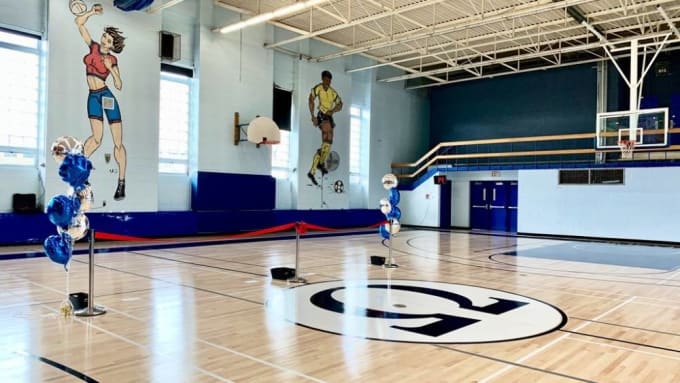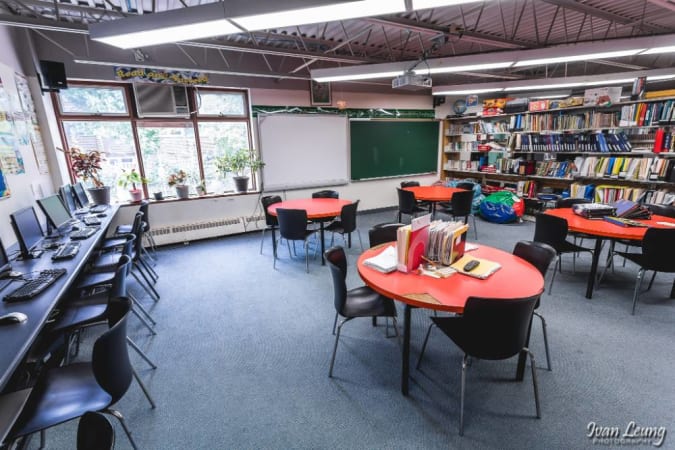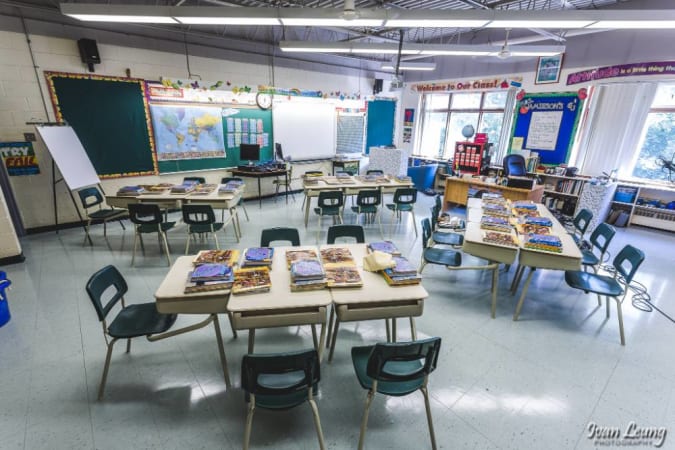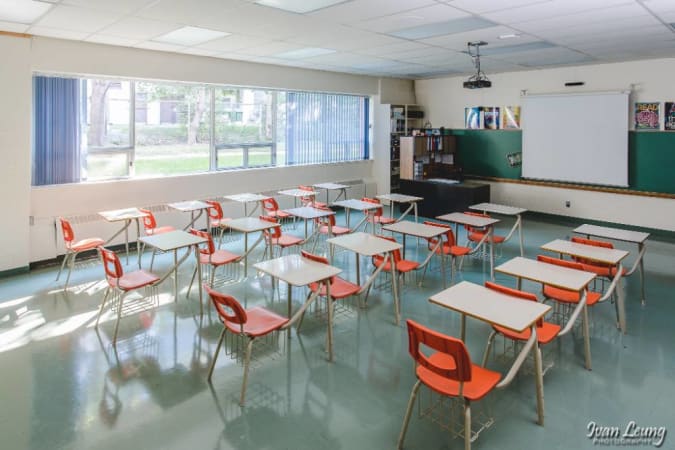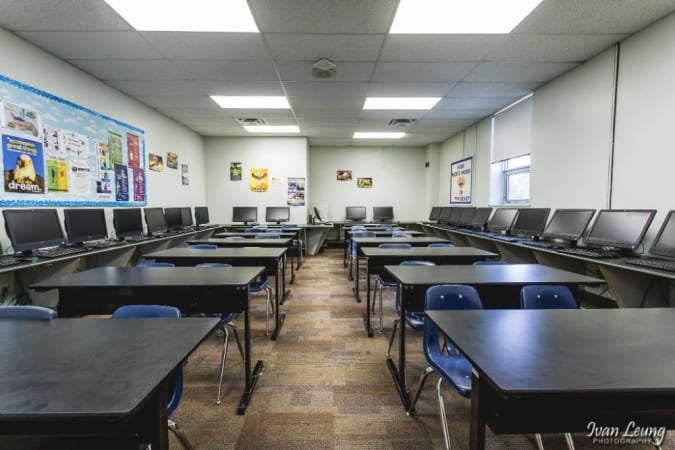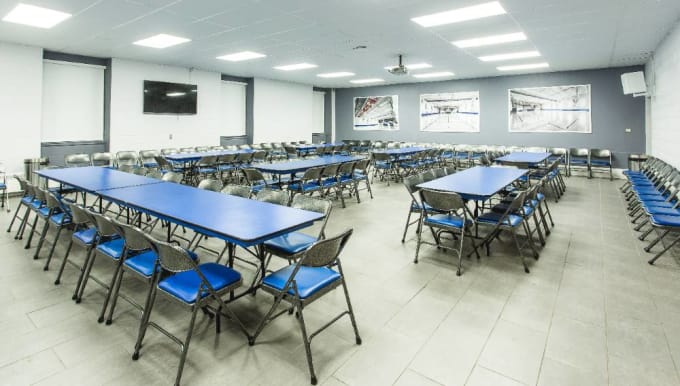Pages in this report:
Select report page
Reviews
Academics
Student Body
Tuition
Admissions
University Placement
Notable Alumni
Grades Gender Class Size Tuition Language of instruction Associations OFIS Enrolment Curriculum Traditional EBROCHURE
School address
531 Finch Ave. W. , North York , Ontario , M2R 3X2 (MAP) 1765 Meadowview Ave. , Pickering , Ontario , L1V 3G7 (MAP) Busing available (View details)
School Busing:
Crawford offers bus transferring.
Service options offered are regular rider, occasional rider.
The regions Crawford offers busing from are:
×
Our Perspective
How we see Crawford Adventist Academy
Crawford is one of those schools that, for whatever reason, has flown a bit below the radar. It was established in 1953 with a dedication to providing a close-knit learning environment based in Christian teaching. The community is a highlight, to be sure, and while families are attracted to the academic program, and the values that inform it, it’s the community that alumni speak of first as the thing they appreciated most while there. Spaces are clean, open, and the campus has a welcome polished feel. While not an international school per se, students are attracted from overseas, and homestay programs are arranged in partnership with the school. The international students add a diversity to the population, and add dimension to the student experience. The ideal student is one preparing to advance to university programs in North America.
School's Perspective
Compare with:
Select school A+ Academy of Advancement
ABC Montessori
Aberdeen Hall Preparatory School
Above & Beyond Learning Experience
Académie de la Capitale
Académie St-Laurent Academy
Académie Westboro Academy
Academie Providence
Academy for Gifted Children - P.A.C.E.
Academy of Thought and Industry Toronto
Ace Acumen High School
Adelfiha Christian Academy
Agate Private School
AIM Without Limits
Albert College
Alcuin College
Alexander Academy
Alexander von Humboldt German International School
Alive Montessori & Private School
Appleby College
Applewood Academy for Progressive Learning
Arrowsmith School
Ashbury College
Ashwood Glen
Astolot Educational Centre
Athol Murray College of Notre Dame
Aurora Alternative Micro School
Aurora Montessori School
Aurora Preparatory Academy
Avalon Children's Montessori School
AVRO Academy
École Montessori
Balmoral Hall School
Banbury Crossroads Academy
Banbury Crossroads School
Bannockburn
Bayview Glen
Bishop Hamilton Montessori School
Bishop's College School
Blue Butterfly Montessori School
Blyth Academy Etobicoke
Blyth Academy Lawrence Park
Blyth Academy Mississauga
Blyth Academy The Glebe, Ottawa
Bodwell High School
Bond Academy
Braemar House School
Brampton Christian School
Branksome Hall
Brentwood College School
Brighton School
Brockton School
Brookes Westshore
Calgary Academy & Calgary Collegiate
Calgary French & International School
Calgary Waldorf School
Cambridge International Academy
Canadian College Italy
Carmel New Church School
Centennial Academy
Central Montessori Schools
Century Private School
CGS (Children's Garden School)
Chaoyin Bilingual School
Children's Garden Nursery School
Chisholm Academy
Christ Church Cathedral School
Christian Virtual School
Clanmore Montessori School
Claren Academy
Clear Water Academy
College Bourget
College Prep International
Collingwood School
Columbia International College
Community Life Christian School
Cornerstone Montessori Prep School
Crescent School
Crestwood Preparatory College
Crestwood School
Curlew Montessori School
De La Salle College
Dearcroft Montessori School
Delano Academy & Delano High
Dewey Institute
Durham Elementary, Durham Academy and G.B.M.S.
Eastgate Academy
Edelweiss Private Academy
Elevate Learning Centre
Elmwood School
Enquiring Minds Montessori
Erudite Private School
Explore Nature
Fairview Glen Montessori School
Fern Hill School - Burlington
Fern Hill School - Oakville
Fern Hill School - Ottawa
Fieldstone School
Foothills Academy
Fort Erie International Academy
Fredericton Montessori Academy
Free Spirit Montessori Downtown
German International School Toronto
Glarea Elevated Learning
Glen Briar Academy
Glenlyon Norfolk School
Glenmore Christian Academy
GlenOak Academy
Greenwood College School
Guidepost Montessori
Guiding Light Academy
Halton Waldorf School
Hamilton District Christian High
Hatch House Montessori School
Haven International School
Havergal College
Hawthorn School
Head Start Montessori School
Heritage Academy of Learning Excellence
Hillfield Strathallan College
Hitherfield School
Holy Name of Mary College School
Holy Trinity School
HongDe Elementary School
Howlett Academy
HTS Online
Hudson College
Humberside Montessori School
IMG Academy
InnovOak School
Island Pacific School
J. Addison School
Jehovah Jireh Christian School
Joan of Arc Academy | Academie Jeanne d'Arc
Junior Academy
Kaban Montessori School
Kanata Montessori
Kells Academy
Kempenfelt Bay School
Kendellhurst Academy
Keystone School
King's Christian Collegiate
King's College School for Bright and Gifted Children
King's-Edgehill School
Kingsley Primary School
Kingsway College School
Kuper Academy
La Citadelle International Academy of Arts & Science
La Maison Montessori House
La Villa Montessori School
Lakefield College School
Laureate College
Lauremont School
Learning Beam Academy
Lee Academy
Leonardo Da Vinci Academy of Arts & Sciences
Linbrook School
London International Academy
Lowell High School
Lower Canada College
Luther College High School
Lycée Claudel
Lycée Français de Toronto
Lycée international de Calgary
Lynn-Rose School
MacLachlan College – Lower School Campus
MacLachlan College – Upper School Campus
Magnificent Minds
March Academy
McDonald International Academy
Meadow Green Academy
Meadowridge School
Mennonite Collegiate Institute
Mentor College
Merrick Preparatory School
Metropolitan Preparatory Academy
Miss Edgar's & Miss Cramp's School
Monarch Academy
Montcrest School
Montessori House of Children
Montessori Learning Centre of Pickering
Mulgrave School
Nancy Campbell Academy
Newton’s Grove School
Niagara Christian Collegiate
Nile Academy
NOIC Academy
North Bay High School
North Point School
North Star Academy
North Star Montessori Elementary School
North Toronto Christian School
Northmount School
Northstar Montessori Private School
Oak Bridge Academy
Oak Learners
Oakville Christian School (OCS)
Oakwood Academy
Olivet School
OMS Montessori
Ontario eSecondary School
Ontario Virtual School
Ottawa Victory Christian Academy
Oxford Learning Academy (Private School)
Passages Centre for Self-Directed Learning
Pear Tree School
Peel Montessori School
Peoples Christian Academy (PCA)
Pickering College
Prestige School - Richmond Hill Campus
Prestige School - Toronto Campus
Prince Edward Montessori School
Progressive Academy
Purcell Collegiate School
Pythagoras Academy
Queen Margaret's School
Quo Vadis Elementary School
Revel Academy
Richland Academy
Richmond Hill Christian Academy
Richmond Hill Montessori Private School
Ridley College
River Valley School
Robert Land Academy
Rockway Mennonite Collegiate
Rosseau Lake College
Rosthern Junior College High School
Rotherglen School - Mississauga
Rotherglen School - Oakville
Rothesay Netherwood School
Rotman Arts and Science School
Rowntree Montessori Schools (RMS)
Royal Cachet Montessori and Private Schools
Royal Crown School
Royal St. George's College
Rundle Academy & Rundle Studio
Rundle College
Rutherford Private School
Sacred Heart School of Halifax
Saplings Nature School
Sathya Sai School of Toronto
Scholars’ Hall
Seneca Hill Private School
Shawnigan Lake School
Shepherd Montessori Private Catholic School
Sherwood Heights School
Sidney Ledson Institute
Somerset Academy
Southpointe Academy
St. Andrew's College
St. Anne's School
St. Clement's Early Learning School
St. Clement's School
St. George's School
St. George's School of Montreal
St. John's-Kilmarnock School
St. John's-Ravenscourt School
St. Jude's Academy
St. Margaret's School
St. Michael's College School
St. Michaels University School
St. Mildred's-Lightbourn School
St. Stephen's School, Rome
Stanstead College
Star Academy
Stratford Hall
Strathcona-Tweedsmuir School
Sudbury Christian Academy
Summit Micro School
Sunflower Early Learning Society
Sunnybrook School
Sunrise Montessori School
Tapply Binet College
TEAM School
TFS - Canada's International School
TFS - Canada's International School (West Campus)
The Abelard School
The Bishop Strachan School
The Children's House Montessori School
The Claremont School
The Clover School
The Cole Academy
The Country Day School
The Dalton School
The Dunblaine School
The Element High School
The Giles School
The Gow School
The Hill Academy
The Learning Common
The Linden School
The Mabin School
The Maples Academy
The Priory School
The Rosedale Day School
The Sacred Heart School of Montreal
The Sterling Hall School
The Study
The Study Academy
The Sycamore School
The YMCA Academy
The York School
Thetford Academy
Third Academy
Toronto District Christian High School
Toronto French Montessori
Toronto Prep School
Toronto STEM School
Toronto Waldorf School
Town Centre Private Schools
Trafalgar Castle School
Trafalgar Ridge Montessori School
Trafalgar School For Girls
Trillium School
Trinity College School
Trinity Montessori School
Unionville Academy
Unionville College
Unisus School
University of Toronto Schools
Upper Canada College
ursa
USCA Academy
Vancouver Independent School for Science and Technology
Vaughan College Private School
Vianney Academy
Villanova College
Vincent Massey Academy
Virtual High School
Walden International School
Waldorf Academy
Webtree Academy
Wesley Christian Academy
West Island College (Calgary)
West Island College (Montreal)
Western Heights Montessori Academy
Westmont Montessori School
Westside Montessori School
Wheatley School
Whytecliff Agile Learning Centre - Burnaby
Whytecliff Agile Learning Centres
Wildwood Academy
Willowbrook Heights
WillowWood School
Wise Owl Private School
Wishing Well Schools
Woodland Christian High School
Yip’s Music & Montessori School
How Crawford Adventist Academy sees itself
The school administration answered our questions
Who are you, as a school?
"Established in 1953, Crawford is committed to the holistic development of our students through academic excellence, spiritual nurture, enhancement of social & physical abilities. With a strong emphasis in music, science and sports, we are a balanced, co-ed family of schools - campus locations in North York (Main JK-12), Pickering (East JK-8) & Mississauga (Peel JK-8) - that successfully develops students for post-secondary education & their chosen career path and to remain committed to a lifestyle of service."
Crawford strives to provide our students with opportunities to connect in the community. Our music groups regularly perform in church worship services and community events.
School gallery
×
No additional photos or videos
Photo-tour of facilities
Athletics facilities
Arts facilities
Campus
Classrooms
Science facilities
Instructional resources
Shared spaces
×
×
Insider Perspectives
How people from the school’s community see Crawford Adventist Academy
Video reviews of Crawford Adventist Academy
Watch our alum interview with Emily Trillana to learn about the unique experience of attending Crawford Adventist Academy.
Written reviews of Crawford Adventist Academy
My experience at Crawford was transformational. I had the opportunity to learn practical life skills...
THE OUR KIDS REPORT: Crawford Adventist Academy
Next steps to continue your research:
Add to shortlist
Compare this school with... A+ Academy of Advancement
ABC Montessori
Aberdeen Hall Preparatory School
Above & Beyond Learning Experience
Académie de la Capitale
Académie St-Laurent Academy
Académie Westboro Academy
Academie Providence
Academy for Gifted Children - P.A.C.E.
Academy of Thought and Industry Toronto
Ace Acumen High School
Adelfiha Christian Academy
Agate Private School
AIM Without Limits
Albert College
Alcuin College
Alexander Academy
Alexander von Humboldt German International School
Alive Montessori & Private School
Appleby College
Applewood Academy for Progressive Learning
Arrowsmith School
Ashbury College
Ashwood Glen
Astolot Educational Centre
Athol Murray College of Notre Dame
Aurora Alternative Micro School
Aurora Montessori School
Aurora Preparatory Academy
Avalon Children's Montessori School
AVRO Academy
École Montessori
Balmoral Hall School
Banbury Crossroads Academy
Banbury Crossroads School
Bannockburn
Bayview Glen
Bishop Hamilton Montessori School
Bishop's College School
Blue Butterfly Montessori School
Blyth Academy Etobicoke
Blyth Academy Lawrence Park
Blyth Academy Mississauga
Blyth Academy The Glebe, Ottawa
Bodwell High School
Bond Academy
Braemar House School
Brampton Christian School
Branksome Hall
Brentwood College School
Brighton School
Brockton School
Brookes Westshore
Calgary Academy & Calgary Collegiate
Calgary French & International School
Calgary Waldorf School
Cambridge International Academy
Canadian College Italy
Carmel New Church School
Centennial Academy
Central Montessori Schools
Century Private School
CGS (Children's Garden School)
Chaoyin Bilingual School
Children's Garden Nursery School
Chisholm Academy
Christ Church Cathedral School
Christian Virtual School
Clanmore Montessori School
Claren Academy
Clear Water Academy
College Bourget
College Prep International
Collingwood School
Columbia International College
Community Life Christian School
Cornerstone Montessori Prep School
Crescent School
Crestwood Preparatory College
Crestwood School
Curlew Montessori School
De La Salle College
Dearcroft Montessori School
Delano Academy & Delano High
Dewey Institute
Durham Elementary, Durham Academy and G.B.M.S.
Eastgate Academy
Edelweiss Private Academy
Elevate Learning Centre
Elmwood School
Enquiring Minds Montessori
Erudite Private School
Explore Nature
Fairview Glen Montessori School
Fern Hill School - Burlington
Fern Hill School - Oakville
Fern Hill School - Ottawa
Fieldstone School
Foothills Academy
Fort Erie International Academy
Fredericton Montessori Academy
Free Spirit Montessori Downtown
German International School Toronto
Glarea Elevated Learning
Glen Briar Academy
Glenlyon Norfolk School
Glenmore Christian Academy
GlenOak Academy
Greenwood College School
Guidepost Montessori
Guiding Light Academy
Halton Waldorf School
Hamilton District Christian High
Hatch House Montessori School
Haven International School
Havergal College
Hawthorn School
Head Start Montessori School
Heritage Academy of Learning Excellence
Hillfield Strathallan College
Hitherfield School
Holy Name of Mary College School
Holy Trinity School
HongDe Elementary School
Howlett Academy
HTS Online
Hudson College
Humberside Montessori School
IMG Academy
InnovOak School
Island Pacific School
J. Addison School
Jehovah Jireh Christian School
Joan of Arc Academy | Academie Jeanne d'Arc
Junior Academy
Kaban Montessori School
Kanata Montessori
Kells Academy
Kempenfelt Bay School
Kendellhurst Academy
Keystone School
King's Christian Collegiate
King's College School for Bright and Gifted Children
King's-Edgehill School
Kingsley Primary School
Kingsway College School
Kuper Academy
La Citadelle International Academy of Arts & Science
La Maison Montessori House
La Villa Montessori School
Lakefield College School
Laureate College
Lauremont School
Learning Beam Academy
Lee Academy
Leonardo Da Vinci Academy of Arts & Sciences
Linbrook School
London International Academy
Lowell High School
Lower Canada College
Luther College High School
Lycée Claudel
Lycée Français de Toronto
Lycée international de Calgary
Lynn-Rose School
MacLachlan College – Lower School Campus
MacLachlan College – Upper School Campus
Magnificent Minds
March Academy
McDonald International Academy
Meadow Green Academy
Meadowridge School
Mennonite Collegiate Institute
Mentor College
Merrick Preparatory School
Metropolitan Preparatory Academy
Miss Edgar's & Miss Cramp's School
Monarch Academy
Montcrest School
Montessori House of Children
Montessori Learning Centre of Pickering
Mulgrave School
Nancy Campbell Academy
Newton’s Grove School
Niagara Christian Collegiate
Nile Academy
NOIC Academy
North Bay High School
North Point School
North Star Academy
North Star Montessori Elementary School
North Toronto Christian School
Northmount School
Northstar Montessori Private School
Oak Bridge Academy
Oak Learners
Oakville Christian School (OCS)
Oakwood Academy
Olivet School
OMS Montessori
Ontario eSecondary School
Ontario Virtual School
Ottawa Victory Christian Academy
Oxford Learning Academy (Private School)
Passages Centre for Self-Directed Learning
Pear Tree School
Peel Montessori School
Peoples Christian Academy (PCA)
Pickering College
Prestige School - Richmond Hill Campus
Prestige School - Toronto Campus
Prince Edward Montessori School
Progressive Academy
Purcell Collegiate School
Pythagoras Academy
Queen Margaret's School
Quo Vadis Elementary School
Revel Academy
Richland Academy
Richmond Hill Christian Academy
Richmond Hill Montessori Private School
Ridley College
River Valley School
Robert Land Academy
Rockway Mennonite Collegiate
Rosseau Lake College
Rosthern Junior College High School
Rotherglen School - Mississauga
Rotherglen School - Oakville
Rothesay Netherwood School
Rotman Arts and Science School
Rowntree Montessori Schools (RMS)
Royal Cachet Montessori and Private Schools
Royal Crown School
Royal St. George's College
Rundle Academy & Rundle Studio
Rundle College
Rutherford Private School
Sacred Heart School of Halifax
Saplings Nature School
Sathya Sai School of Toronto
Scholars’ Hall
Seneca Hill Private School
Shawnigan Lake School
Shepherd Montessori Private Catholic School
Sherwood Heights School
Sidney Ledson Institute
Somerset Academy
Southpointe Academy
St. Andrew's College
St. Anne's School
St. Clement's Early Learning School
St. Clement's School
St. George's School
St. George's School of Montreal
St. John's-Kilmarnock School
St. John's-Ravenscourt School
St. Jude's Academy
St. Margaret's School
St. Michael's College School
St. Michaels University School
St. Mildred's-Lightbourn School
St. Stephen's School, Rome
Stanstead College
Star Academy
Stratford Hall
Strathcona-Tweedsmuir School
Sudbury Christian Academy
Summit Micro School
Sunflower Early Learning Society
Sunnybrook School
Sunrise Montessori School
Tapply Binet College
TEAM School
TFS - Canada's International School
TFS - Canada's International School (West Campus)
The Abelard School
The Bishop Strachan School
The Children's House Montessori School
The Claremont School
The Clover School
The Cole Academy
The Country Day School
The Dalton School
The Dunblaine School
The Element High School
The Giles School
The Gow School
The Hill Academy
The Learning Common
The Linden School
The Mabin School
The Maples Academy
The Priory School
The Rosedale Day School
The Sacred Heart School of Montreal
The Sterling Hall School
The Study
The Study Academy
The Sycamore School
The YMCA Academy
The York School
Thetford Academy
Third Academy
Toronto District Christian High School
Toronto French Montessori
Toronto Prep School
Toronto STEM School
Toronto Waldorf School
Town Centre Private Schools
Trafalgar Castle School
Trafalgar Ridge Montessori School
Trafalgar School For Girls
Trillium School
Trinity College School
Trinity Montessori School
Unionville Academy
Unionville College
Unisus School
University of Toronto Schools
Upper Canada College
ursa
USCA Academy
Vancouver Independent School for Science and Technology
Vaughan College Private School
Vianney Academy
Villanova College
Vincent Massey Academy
Virtual High School
Walden International School
Waldorf Academy
Webtree Academy
Wesley Christian Academy
West Island College (Calgary)
West Island College (Montreal)
Western Heights Montessori Academy
Westmont Montessori School
Westside Montessori School
Wheatley School
Whytecliff Agile Learning Centre - Burnaby
Whytecliff Agile Learning Centres
Wildwood Academy
Willowbrook Heights
WillowWood School
Wise Owl Private School
Wishing Well Schools
Woodland Christian High School
Yip’s Music & Montessori School



